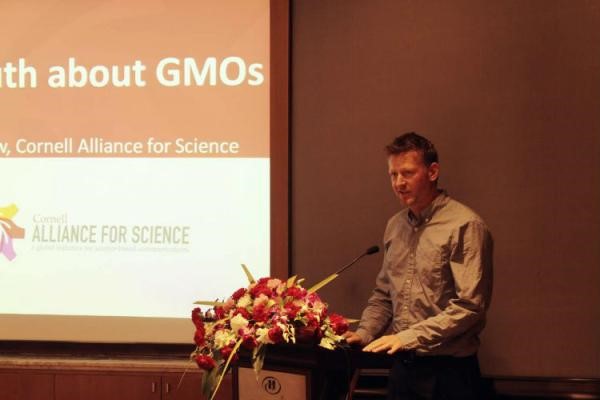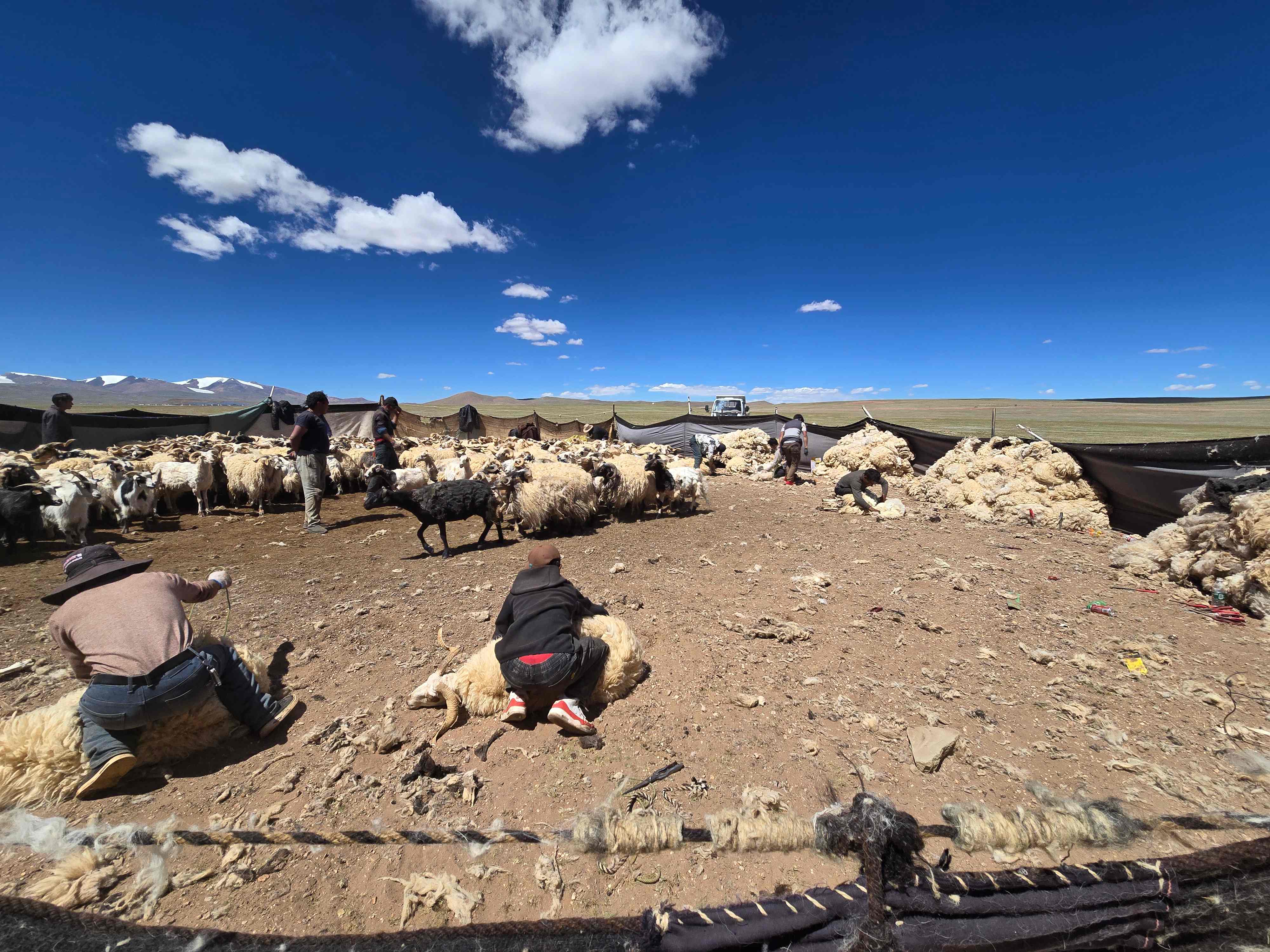美国生物进化学教授就转基因问题挑战林纳斯
来源: GM Watch 发布时间:2017-05-17 阅读:3928 次
翻译:jrry86
文章来源:GM Watch;原标题:Professor John Vandermeer challenges environmentalist Mark Lynas on GMOs
原文链接:http://www.gmwatch.org/en/news/archive/2013/14571-professor-john-vandermeer-challenges-lynas-on-gmos;
原文发表时间:2013年1月8日;说明:编辑时,对译文略有删减。
食物主权按:
近日中国的挺转集团引进了外来的和尚:英国新自由主义环保人士、曾经的反转人士马克·林纳斯(Mark Lynas)。身为记者的林纳斯曾经在英国爱丁堡大学就读历史和政治学,一度反对转基因,2010年开始转向支持转基因。最近,这位记者被安排在中国著名学府北京大学和中山大学演讲转基因问题,某些中科院院士和农业部官员亲临捧场。转基因集团通常把非专业人士(尤其是质疑和反对转基因的人士)贬斥为“文傻”,企图以此剥夺他们质疑的权利。那么,同样是“文傻”的挺转分子,为何就能登上北大、中大的讲坛,大谈特谈转基因呢?针对这一现象,著名军旅作家吕永岩评论道:
可惜,北大的学生不给面子,安排个不大的讲堂,也只稀稀拉拉地来了一半。(可容纳近三百人的阳光大厅来了约一半的人)
北大学生也纳闷啊?“马克·林纳斯”是个神马东西?乍就从没听说过?
一个文科生、一个生物学外行,乍就能上北大说道转基因这科学?
人与人不一样。反转时,也就是大妈族里的普通人。挺转了,成了精英,成了中国院士眼中的专家!
今天的推送是美国密歇根大学生态学和进化生物学教授约翰·范德米尔(John Vandermeer)的博文,在这篇文章中,范德米尔分享了重要的科学发现,并谆谆教导林纳斯要诚实地探索科学。
2017年5月8日林纳斯在北京大学演讲
新自由主义环保人士马克·林纳斯为他曾经激进反转基因而道歉,声称在发现了“科学”之后,现在他认为我们需要转基因来喂养世界。
他宣称任何反转基因的人都是反科学的,因为“争论已经结束了”,而“科学共识”取得了胜利……这是一个众所周知的来自工业界的宣传口径,这让我们怀疑林纳斯可能已经被“欧罗巴生物” (EuropaBio)的“转基因形象大使项目”招募。“欧罗巴生物”位于布鲁塞尔,是财力雄厚、为转基因公司服务的游说团体,它于2011年启动了一个国际拓展项目,以便在欧洲掀起新一轮转基因作物浪潮。[1]
林纳斯的妄语引来了真正科学家的回应,来自密歇根大学生态和进化生物学系的约翰·范德米尔博士对马克·林纳斯引人注目的科学转变发表了如下评论。
密歇根大学生态学和进化生物学教授
约翰·范德米尔
马克·林纳斯的“转变”引发了世界风暴:一个坏家伙突然看见了光明并穿上了白色服装。他转变的是这么彻底,世界各地的福音传教士都该向他学习,探求他所传递的信息中的秘密。正当工业化农业体系在全世界范围受到来自努力推动可持续发展体系的人们的责难之时,马克的转变实在是来的太及时了。尽管很遗憾其政治影响是负面的,但也会逐渐消退。
我在密歇根大学教授科学(生物学),作为一个科学传授者,当我听到有人说“我发现了科学”,肯定是很高兴的,这太好了。而马克的发现看上去就像我在高中初期发现科学时一样充满童真,所以与那些批评他的人相反,我支持他的转变并鼓励他继续接受教育。当然,问题就在于类似这样的新发现,最后会产生各种各样的印象,一经细究,就可能发现是误导,有时甚至是错误。问题在于,在这种初级水平上,所有的科学教师都会用近似的比喻和简单的图标来过度简化事物,以努力使他们的学生明白相当复杂的概念。
在研究生期间学习的是复杂事物的纲要。现在马克·林纳斯说他发现了科学,我们所有人都应该鼓励他继续接受教育。我怀疑他会发现他的操控者会不太满意他继续教育所收获一些知识,但我们只能寄望于他对科学思想体系满是孩子气的热情会促使他更加严肃地学习科学的复杂性;我们只能寄望于他不只是一个寻求公众关注的反水者、精通政治说教,诸如“我曾经反对X,但现在我很喜欢它(哦对了,就我的底线来说,支持它是更理智的)”。他已经发现了高中生物学,现在是时候进入大学继续学习了。
例如他或许会发现内分泌系统,它是我们生命中一个十分重要的因素,科学显示它会被大量各种各样的分子所“扰乱”。有些时候,这些分子是自然产生的,但更多时候,它们是现代工业体系所应用的各种化学试剂组合的一部分。他将会发现大量科学研究发现草甘膦(孟山都农达除草剂的活性成分)与内分泌干扰相关,他将会意识到内分泌干扰有时会带来负面结果,例如生殖缺陷和癌症。至于阴茎受到众所周知的影响,我迫不及待地想看到他的的反应。而在他的生态学课堂,他可能会发现大分子降解后的产物会在环境中会持续存在数十年甚至数百年。
而在生理学课上,他将会发现小剂量的东西也会带来相当大的后果。例如农达是个商业产品,其活性成分是草甘膦,但是还含有其它化学试剂来提高草甘膦的功效,特别是加入了一种试剂作为表面活性剂,来确保含有农达的液体附着在被喷洒的作物上。即使草甘膦对环境是完全友好的(其实不是如此,但为方便讨论,就假定它如此),人们已经发现此化学试剂有杀灭作用。他可以查看匹兹堡大学的研究工作,证明农达是如何杀死两栖动物的,并不是说他应该关心两栖动物,而是我确信从他所接受到的历史学训练,他应该能理解“矿工的金丝雀”这个概念(译者注:指这一研究警示了危险的存在)。
等他进一步深入探究分子生物学,他将发现更多的东西,例如上位效应、多基因遗传、(基因)连锁、启动子、转座子、还有很多其它的我们现在知道是处于生物体基因中心的往往是神秘而复杂的问题(并可以学会那些他经常使用但并不真正理解的生僻词汇的含义)。他还会看到指望仅做一件事(例如向一个大的基因中插入一个DNA片段)很可能从一开始就是无法做到的(译者注:意指插入一段基因时,期望只发生插入这一件事,而不引发其它连锁反应,很可能是无法做到的)。正如基因学家理查德·列万廷(Richard Lewontin,哈佛大学进化生物学家、基因学家,编注)所说的,基因组就像一个生态系统。我们都知道当你试图向生态系统引入一个单一物种会发生什么,通常什么也不会发生,这当然会让人自鸣得意。但是有时候这种引进却会带来惨重灾难,用谷歌搜索一下就会发现一些例子:棕色蛇、猫鼬、甘蔗蟾蜍、野葛、尖吻鲈(还有其它很多)。如果基因像生态系统一样,那就无法保证不会发生类似的毁坏,而少数那些还不了解这种复杂性的科学家需要重新接受高等教育,学习一下关于复杂体系的课程。
哈佛大学教授理查德·列万廷:基因组就像一个生态系统
这些内容都是马克继续高等科学教育时可能学到的,但是我真的等不及他发现进化论。一些科学家仅仅依靠研究一个特定植物物种(马克,它的学术名称是“拟南芥”)来探究进化出抗性的可能性,并得出结论说作物需要很长时间才能进化出针对农达的抗性,因而无关紧要。理解这其中出现了什么问题,对于马克来说将是很好的一课,因为现在我们知道(并且我们确切知道其原因,虽然它很复杂),已经有超过20种植物对农达进化出了抗性。
而那些Bt作物被认为可以减少杀虫剂使用,但实际上它们对环境产生了影响,而且不是正面的。世界各地的农民不得不使用其它杀虫剂,因为很多主要的玉米害虫已进化出对Bt毒素的抗性,而贫困农民传统手工使用(甚至在有机种植中使用)的Bt农药也已经不再有效。
当他进入高等教育课程的定量阶段时,他会发现很多有趣的数字。正如过去很多人指出的,评价一个新技术时,最基本的问题就是“该技术是用来解决什么问题的”?似乎马克很幼稚的接受了我们需要增加产量来喂养世界这个转基因论点。只需要对证据作一点儿“科学”验证(另外,马克,证据是所有科学家都倚重的概念),他就会发现,有太多报告显示,迄今为止转基因的记录不容乐观。根据忧思科学家联盟(the Union of Concerned Scientists)的一个范围广泛的综述报告,没有证据证明转基因带来了产量的增加。很明显,利润是极大的增加了,但那些利润是被提供种子及技术配套产品的公司所获取了(如果我们诚实的话,就会承认这就是该类技术的真正目的)。但是产量或生产率则与非转基因品种几乎一样。实际上这一点也不奇怪,因为孟山都这样的公司从一开始就不会关心产量,那不过是传销手段,忽悠无辜的人们去接受他们提出的世界“需要”转基因的说辞。实际上,孟山都真正需要的,一是控制种子的供应,二是销售它们的主要产品农达。在这方面,它们十分成功,至少在美国是如此。
所以,最后我要为马克·林纳斯发现了科学而鼓掌。事实上,我鼓励任何还未“发现”科学的人赶紧去发现。这是观察世界的一个真正神奇的方法,自从伽利略力促当权者重视数据以来,这个方法一直与我们同在。你也许能回想出当时的情形,当面对数据的时候,教会的反应就如孟山都一样,把你的耳朵捂上并制造出噪音,攻击任何把相关信息传递给你的人。
[1] 编者注:关于EuropaBio是财力雄厚的转基因游说团体,以及该团体的转基因形象大使项目,参见英国《卫报》报道:https://www.theguardian.com/environment/2011/oct/20/europabio-gm-ambassadors-europe
附原文:
Professor John Vandermeer challenges environmentalist Mark Lynas on GMOs
Neoliberal environmentalist Mark Lynas recently gave a talk at the Oxford Farming Association in which he apologized for once militating against GMOs. Now, after having discovered "science", has decided we need GMOs to feed the world.
Anyone against GMOs, he claims, is anti-science because "the debate is over" and the "scientific consensus" has won... This is an all to familiar argument from the industry, and leads us to suspect that Lynas may have been recruited by EuropaBio's "Pro-GM Ambassador Programme." EuropaBio is the very rich and vocal lobby association of GM companies in Brussels that prepared an international outreach programme in 2011 to give a new impulse to GM crops in Europe. [1]
Lynas's rant is bringing a response from actual scientists. Dr. John Vandermeer from the Department of Ecology and Evolutionary Biology at the University of Michigan comments on Mark Lynas' promising scientific conversion.
Guest blog by Professor John Vandermeer, Department of Ecology and Evolutionary Biology, University of Michigan at Ann Arbor
DISCOVERING SCIENCE
发现科学
The “conversion” of Mark Lynas has taken the world by storm, a bad guy suddenly sees the light and dresses in white. So complete was his conversion that evangelists around the world would be wise to seek the secrets of his messengers. And his conversion happened at an opportune time for the industrial agricultural system, under fire all over the world from people trying to push for a more sustainable system. But the political fallout, as unfortunately negative as it is, is something that will subside. There is something else that we should all applaud.
I teach science (biology) at the University of Michigan and, as a science teacher, I cannot help but be pleased when someone says “I discovered science.” That is great. And Mark’s discovery seems to have been as innocently childlike as when I discovered science in my junior year in high school. So, contrary to what some of his critics have said, I applaud his conversion and urge him to continue his education. The problem, of course, is that a new discovery like this can lead to all sorts of impressions that, upon further study, turn out to be misleading, sometimes false. The problem is that at this elementary level, all science teachers oversimplify things, using approximate metaphors and simplified diagrams to try and get their students to understand some rather complex ideas.
What you subsequently learn in graduate school is the compendium of complications. Mark Lynas has now discovered science and it is now up to all of us to encourage him to continue his education. Some of the things I suspect he will find will not sit well with his current handlers, but we can only hope that his boyish enthusiasm for science as an ideology, will carry over to a more serious study of science’s complications. We can only hope that he is not just one of those publicity-seeking conversionistas, well-versed in the politically compelling “I once was against X, but now I love it (oh by the way, it makes more sense for my bottom line to be for it)”. He has discovered high school biology. Now it’s time to go to college.
The things he might discover are, for example, the endocrine system. It’s a pretty important fact of our lives and science has shown that it can be “disrupted” by a wide variety of molecules. Sometimes those molecules occur naturally, but frequently they are part of the cocktail of chemicals usually applied in the modern industrial system. He will discover that a bunch of scientific studies have linked Glyphosate (the active ingredient in Monsanto’s Roundup) to endocrine disruption and he will come to realize that endocrine disruption can sometimes have negative consequences, things like birth defects and cancer, and I can’t wait to see his response to the well-know effects on penises. And in his ecology class he might discover how breakdown products of large molecules can persist in the environment for tens or even hundreds of years.
And in his physiology course he will discover that small doses of things can have pretty big consequences. So, for example, roundup is a commercial product whose active ingredient is glyphosate, but that contains other chemicals to enhance its performance. In particular one chemical is added to act as a surfactant, making sure that the liquid that contains the roundup sticks to the plant it is attacking, Even if glyphosate was completely benign in the environment (which it is not, but for sake of argument assume it is) it turns out that the surfactant kills. He can check out the work done at the University of Pittsburg on how roundup kills amphibians – not that he should necessarily care about amphibians, but from his training in history I’m sure he understands the notion of the miner’s canary.
As he delves further into molecular biology he will discover things like epistasis, polygenetic inheritance, linkage, promotors, transposable elements, and a host of other sometimes enigmatic complications that we now understand to be at the center of any organism’s genome (and might learn the meaning of those 10 dollar words that he seems to use but not understand, like mutagenesis and gene flow). And he will see that doing just one thing (e.g., inserting a piece of DNA into a big genome) is probably not possible in the first place. As the geneticist Richard Lewontin has said, the genome is like an ecosystem. And we all know what can happen when you, for example, try and introduce a single species into an ecosystem. What usually happens is nothing, which of course can lead to complacency. But occasionally the introduction is catastrophic. Some google search topics that will enlighten are, brown snake, mongoose, cane toads, Kudzu, Nile perch (there are many others). If genomes are like ecosystems, there is nothing at all that suggests equivalent disruptions could not occur, and the few scientists who remain unaware of this complication need to refresh their graduate education with a course in complex systems.
These are all things that Mark might learn as he pursues his more advanced study of science. But I really can’t wait until he discovers evolution. When a group of scientists relied upon a particular species of plant (technically, Mark, it’s called Arabidopsis) to explore the possibility of the evolution of resistance, they concluded that the evolution of resistance to their roundup-ready crops would take so long as to not matter.
And those Bt crops that supposedly reduce pesticide use, well, they have indeed had an effect on the environment, but not a positive one. Scattered around the world are farmers who are forced to use other insecticides since many of the major corn pests have evolved resistance to the Bt toxin, and that very toxin used in an artisanal way by poor farmers (even organic ones) is now not available.
When he gets into the quantitative aspects of his education some truly amazing numbers will jump out at him. As so many people have noted in the past, when judging a new technology the fundamental question to be asked is “what problem is this technology meant to solve?” Mark seems to have naively accepted the GMO argument that we need to increase production to feed the world. With a bit of “scientific” examination of evidence (by the way, evidence is a concept that all scientists rely on, Mark) he will discover that according to many reports the record on GMOs thus far is not exactly hopeful. According to an extensive review by the Union of Concerned Scientists, there is scant evidence that production increases with the use of GMOs. Obviously profits increase enormously, that is, profits for the companies that supply the seed and other inputs that go along with their technological package (which, if we are to truly honest, that is the whole point), but production or productivity is pretty much the same as for non GMO varieties. It’s actually not surprising since companies like Monsanto never cared about production in the first place, that was just PR to get innocents to accept their argument that the world “needs” GMOs. What Monsanto actually wanted was 1) control of the supply of seed and 2) sales of their major product, Roundup. At that they have been immensely successful, at least in the United States.
So, in the end I applaud Mark Lynas’s discovery of science. Indeed, I encourage anyone who has not yet “discovered” it to do so. It is a truly amazing way of looking at the world that has been with us since Galileo urged the powerful to look at the data. You may recall from that example that the church reacted sort of like Monsanto, plug your ears and make noises when faced with the data, and attack the messengers who bring it to you.
John Vandermeer
Department of Ecology and Evolutionary Biology
University of Michigan
[1] John Vidal and Hanna Gersmann. 2011. “Biotech group bids to recruit high-profile GM 'ambassadors'”, The Guardian, 20 Oct.,
https://www.theguardian.com/environment/2011/oct/20/europabio-gm-ambassadors-europe

















